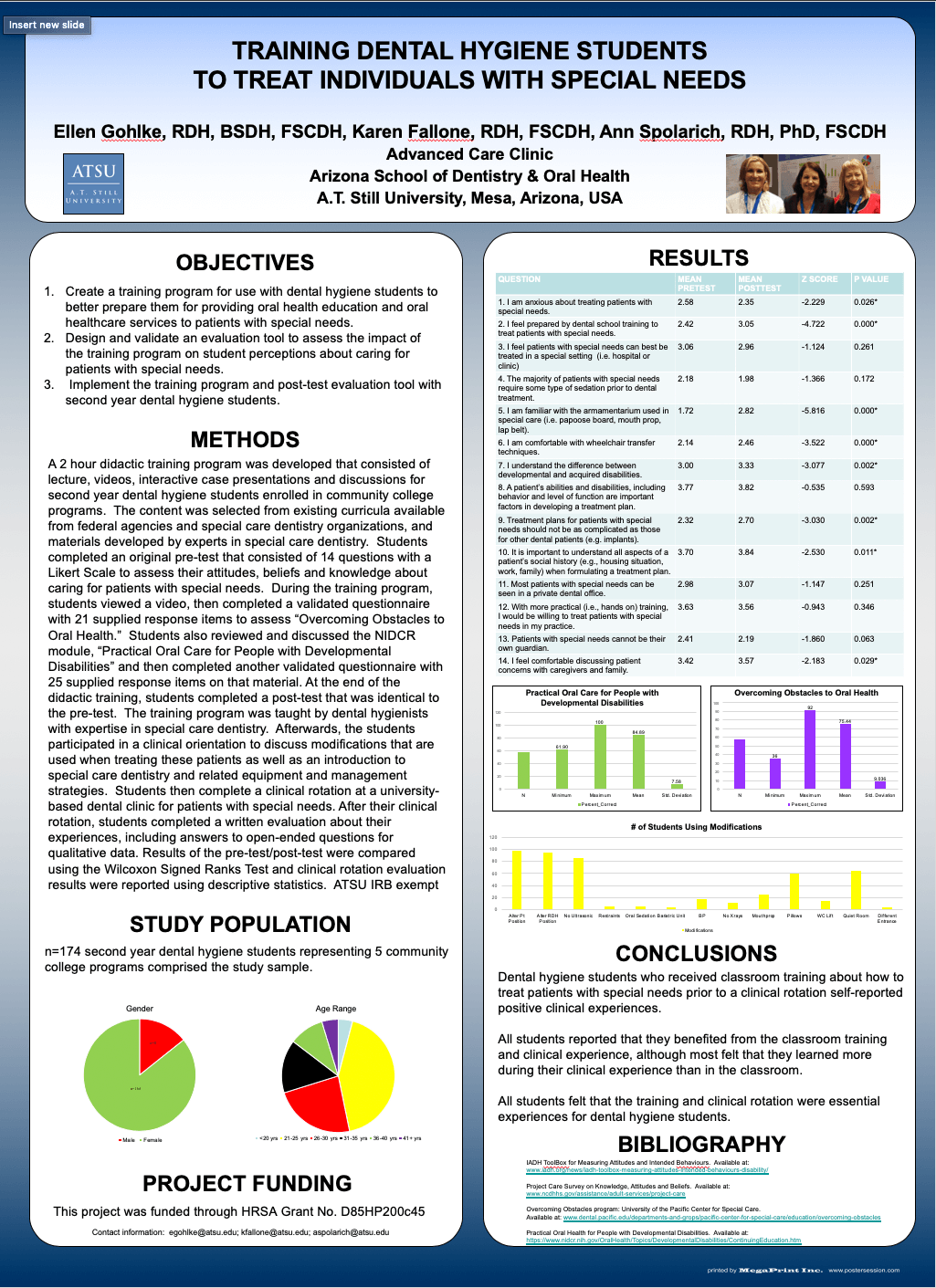Train Students to Treat Individuals with Special Needs
Contributors:
Ellen Gohlke, RDH, BSDH, FSCDH
Karen Fallone, RDH, FSCDH
Ann Spolarich, RDH, PhD, FSCDH
Ellen Gohlke, RDH, BSDH, FSCDH
Karen Fallone, RDH, FSCDH
Ann Spolarich, RDH, PhD, FSCDH
Participating Organizations:
Arizona School of Dentistry & Oral Health
Arizona School of Dentistry & Oral Health
Objectives
1. Create a training program for use with dental hygiene students to better prepare them for providing oral health education and oral healthcare services to patients with special needs. 2. Design and validate an evaluation tool to assess the impact of the training program on student perceptions about caring for patients with special needs. 3. Implement the training program and post-test evaluation tool with second year dental hygiene students.
1. Create a training program for use with dental hygiene students to better prepare them for providing oral health education and oral healthcare services to patients with special needs. 2. Design and validate an evaluation tool to assess the impact of the training program on student perceptions about caring for patients with special needs. 3. Implement the training program and post-test evaluation tool with second year dental hygiene students.
Methods
A 2 hour didactic training program was developed that consisted of lecture, videos, interactive case presentations and discussions for second year dental hygiene students enrolled in community college programs. The content was selected from existing curricula available from federal agencies and special care dentistry organizations, and materials developed by experts in special care dentistry. Students completed an original pre-test that consisted of 14 questions with a Likert Scale to assess their attitudes, beliefs and knowledge about caring for patients with special needs. During the training program, students viewed a video, then completed a validated questionnaire with 21 supplied response items to assess “Overcoming Obstacles to Oral Health.” Students also reviewed and discussed the NIDCR module, “Practical Oral Care for People with Developmental Disabilities” and then completed another validated questionnaire with 25 supplied response items on that material. At the end of the didactic training, students completed a post-test that was identical to the pre-test. The training program was taught by dental hygienists with expertise in special care dentistry. Afterwards, the students participated in a clinical orientation to discuss modifications that are used when treating these patients as well as an introduction to special care dentistry and related equipment and management strategies. Students then complete a clinical rotation at a university-based dental clinic for patients with special needs. After their clinical rotation, students completed a written evaluation about their experiences, including answers to open-ended questions for qualitative data. Results of the pre-test/post-test were compared using the Wilcoxon Signed Ranks Test and clinical rotation evaluation results were reported using descriptive statistics. ATSU IRB exempt
A 2 hour didactic training program was developed that consisted of lecture, videos, interactive case presentations and discussions for second year dental hygiene students enrolled in community college programs. The content was selected from existing curricula available from federal agencies and special care dentistry organizations, and materials developed by experts in special care dentistry. Students completed an original pre-test that consisted of 14 questions with a Likert Scale to assess their attitudes, beliefs and knowledge about caring for patients with special needs. During the training program, students viewed a video, then completed a validated questionnaire with 21 supplied response items to assess “Overcoming Obstacles to Oral Health.” Students also reviewed and discussed the NIDCR module, “Practical Oral Care for People with Developmental Disabilities” and then completed another validated questionnaire with 25 supplied response items on that material. At the end of the didactic training, students completed a post-test that was identical to the pre-test. The training program was taught by dental hygienists with expertise in special care dentistry. Afterwards, the students participated in a clinical orientation to discuss modifications that are used when treating these patients as well as an introduction to special care dentistry and related equipment and management strategies. Students then complete a clinical rotation at a university-based dental clinic for patients with special needs. After their clinical rotation, students completed a written evaluation about their experiences, including answers to open-ended questions for qualitative data. Results of the pre-test/post-test were compared using the Wilcoxon Signed Ranks Test and clinical rotation evaluation results were reported using descriptive statistics. ATSU IRB exempt
